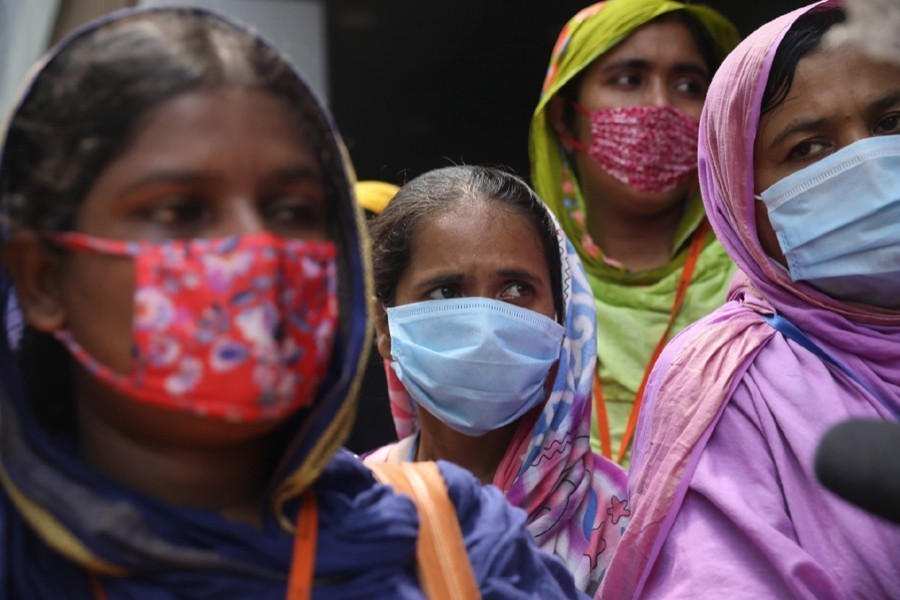
Published :
Updated :

The emergence of COVID-19 has stirred the entire world since March 2020. The virus has even the world's mightiest leaders waving the white flag in desperation. "When will it end, if at all?" - 4.55 million have died as of today and the world is waiting for the answer.
Pandemics and plagues aren't new to humankind. Since the prehistoric era, throughout different timelines of history, these brutal killers have wiped out thousands of millions of people across the continents. Smallpox being the cruelest one of them afflicted humanity for over 3000 years killing 300 million people in the twentieth century alone before completely disappearing off the face of the earth. In fact, this is the only human disease we have ever eradicated and to this date is regarded as the greatest victory of medical science.
Smallpox was twice as contagious as Covid-19, with a 30 per cent mortality rate. Yet a resilient global effort was able to wipe it out of existence. So can the same be done with COVID-19?
Before getting into that, let's look at the factors that helped the eradication of Smallpox. Apart from rapid vaccination and global cooperation, researchers also came up with an intelligent way of containing the infection rate called "contact tracing and isolation". Instead of aiming to vaccinate everyone at once, the World Health Organization advocated a more targeted approach in which public health professionals concentrated on affected individuals via contact tracing. Doctors and volunteers would isolate the individual and vaccinate anyone who had come into contact with them, as well as anyone who had come into contact with those people, essentially creating an immune buffer between the infection and the rest of society. This was referred to as "ring vaccination." It worked like a miracle even in densely populated regions like India.
Now let's look at the scenario of COVID-19. Enhanced medicinal technology has brought us vaccines in record time and a global approach to it is already in action. But even after this, scientists are still not optimistic about the fight against COVID-19 being the same as that with Smallpox. With the novel virus, there is not much room for a ring vaccination process similar to Smallpox. With smallpox, the symptoms were straightforward and people didn't become contagious until they started developing rashes. So it was easier to track and isolate the infected. This is not at all the case with COVID-19. The symptoms aren't linear, varying from person to person, and even asymptomatic individuals are capable of spreading the disease which has contributed to the degree of the virality.
COVID-19 in many ways is similar to Smallpox as both viruses can be transmitted through contact with infected people or objects handled by them. But an important variable between the two is the animal vector. While the Smallpox virus could only pass from human to human, the zoonotic coronaviruses spill from animals to humans too. Researchers believe the SARS_CoV2 virus originated in bats, and currently, about 13 animal species are susceptible to it including cats and dogs. So even if we manage to eradicate COVID-19 through global vaccination, there is always a fear of it spilling back into humanity like it did the first time.
Then comes the wildcard factor - the coronavirus variants of concern, which are basically mutations of the original virus resulting in it becoming more and more adaptable. While mutation is a very common trait of viruses and can be both favourable or adverse for them, it has so far been in coronavirus's favour increasing its transmissibility, severity, ability to evade detection, resistance to vaccine-induced immunity, and resilience to treatments. Scientists are concerned that there may come a point where the existing vaccines are rendered completely ineffective by the newer strains. Smallpox virus, on the other hand, did not have any mutants.
In order to combat rapid mutations in the virus, people need to be immune to it as the virus cannot mutate without a host. The more it spreads, the greater the chances of its variants appearing. Hence, global collaboration is cardinal. Instead, since the beginning of the pandemic, the world has seen its countries taking a nationalist approach to it. Export bans on protective gears and vital drugs, even on vaccines; richer countries buying up supplies leaving the poor ones more vulnerable, the US pulling its funding from WHO -- questions the promise of international cooperation. UN Secretary-General António Guterres revealed in February that ten nations had administered 75 per cent of the world's COVID-19 vaccination supply. Unequal access to vaccines and other healthcare facilities in swathes of the world have posed the threat of the coronavirus becoming the "forever virus". Viruses do not have regard for nations or ideologies, as long as the virus is allowed to spread in pockets in any part of the world, no one is safe, not even the vaccinated population.
Researchers believe that due to the variables between COVID-19 and Smallpox, it might not be possible to completely eradicate the first one like it was for the latter. But that doesn't mean the contagion and severity of it cannot be reduced. After the world population has attained herd immunity -- either through infection or vaccination (hopefully the latter), the pandemic shall attenuate and devolve to an endemic with less fearsome strains. We have seen the same happen to influenza flu, swine flu, malaria, and the likes. That's also how the four endemic coronaviruses, called, 229E, OC43, NL63, and HKU1, behave.
All in all, COVID-19 is just not a good candidate for eradication. Thankfully, that isn't the only option. The virus can be managed and controlled with annual vaccinations and boosters, like other cases of flu, rarely growing into anything more than an annoying childhood common cold.


 For all latest news, follow The Financial Express Google News channel.
For all latest news, follow The Financial Express Google News channel.